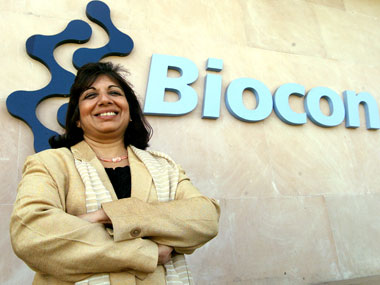New York:
Amid concerns about runaway health spending, American industry leaders have said the world can find inspiration in India’s ability to provide low-cost medical innovation. Almost on cue, The New Yorker has a big profile of Kiran Mazumdar-Shaw, the founder of Biocon, India’s first and largest biotech company, started in 1978. The piece asks the question “Can one self-made woman reform health care for India, and the world?”
Kiran Mazumdar-Shaw, the founder of Biocon, India’s first and largest biotech company, started in 1978. Reuters.
It cites her company’s work on diseases that are prevalent in countries like India, and also her philanthropic work to bring health care to the poor. Since 1996, Biocon has been developing its own drugs, in addition to generics. Biocon produces drugs for cancer, diabetes and auto-immune diseases.
“I would love to see one of our novel drugs make it big with the ‘Made in India’ label,” Mazumdar-Shaw, who at 25 created a biotech company by working out of the garage of a rented one-bedroom house in Bangalore, told The New Yorker’s Ariel Levy.
Never mind that no one in the ’70s knew what biotech was, that she is a woman and that backers were hard to come by because of these two points. Today, Mazumdar-Shaw’s Biocon is a $1 billion operation.
Most importantly, it is in stage-three clinical trials for both a cancer treatment drug and a variety of insulin that can be taken orally, a product that has long been the global pharmaceutical industry’s “holy grail,” said the US magazine.
“I grew up being apologetic about India,” Mazumdar-Shaw told Forbes. “I felt a strong urge in me to create something that would be a piece of the new India. I did not want the new generation to feel apologetic.”
Well, India is far from apologetic about Mazumdar-Shaw’s Biocon Park which sits on a verdant 90-acre campus in Bangalore and houses some 5,000 molecular biologists, technicians and employees. At the entrance is an enormous sculpture of a double helix with the words “Recombinant Revolution” on the base.
Mazumdar-Shaw works a few doors down from her husband, John Shaw, who became Biocon’s vice chairman in 2001, three years after the couple married. John Shaw, who grew up in Scotland, came to Bangalore in 1991 as chairman of Madura Coats Ltd.
Mazumdar-Shaw told the magazine that she thinks of her husband as a “very secure person” who is comfortable in his role. “After we got married,” John Shaw told The New Yorker “we sat down and Kiran said, ‘Now, John. You’ve got a career in the textile industry. I’ve got a career in the biotech industry. One of us has to give up our career, and it’s not me.” When he looked at her accounts ledgers, he agreed.
In 2004, Biocon held an initial public offering (IPO), which brought Mazumdar-Shaw’s net worth to half a billion dollars. It is now almost double that, indicated The New Yorker. Not long afterward, she started the Biocon Foundation, to carry out her philanthropic work.
“Although charity is not prevalent among wealthy Indians — they give at about a quarter of the rate of Americans — Mazumdar-Shaw has spent $15 million on her cancer hospital and the Arogya Raksha,” noted The New Yorker.
The magazine highlighted Mazumdar-Shaw’s model for sustaining the 1,400-bed Mazumdar-Shaw Cancer Centre in Bangalore which treats poor patients for free or at steep discounts. At the center, the wealthy pay market price for MRIs and other diagnostic procedures, subsidising discounts for the poor.
“At 4 a.m, it’s free, 8 a.m to 5 p.m it is full price, 6 p.m to 10 p.m it’s half price,” Mazumdar-Shaw explained. She said that one-time donations — what she describes as a “turn-on, turn-off mentality” — won’t bring change; the market has to adjust.
What the Mazumdar-Shaw Cancer Center is doing is similar to the Madurai-based Aravind Eye Hospital. Deceased management guru CK Prahalad had trumpeted how the Aravind Eye Hospital had created a new hospital business model. Aravind’s founders use a tiered pricing structure that charges wealthier patients more for fancy meals or air-conditioned rooms, letting the firm cross-subsidise free care for the poorest. Aravind rotates its staff at its five hospitals to deal with both paying and non-paying patients so there is no difference in quality.
In addition to starting the Huskur clinic and nine others like it in Karnataka, Shaw-Mazumdar’s Arogya Raksha programme has started a micro-insurance programme and hired local women to go door-to-door offering screening services for oral cancer. Every year, Shaw donates $2 million to support health insurance coverage for 1,00,000 Indian villagers.
“Mazumdar-Shaw has become a national mascot for rectitude,” observed The New Yorker,adding that her company is run with deep “corporate nationalism” — you know there is going to be no tax fiddle. Not surprisingly, Mazumdar-Shaw was one of the first civic-minded Indian business leaders to tweet support for Anna Hazare.
source: http://www.FirstPost.in / by Uttara Choudhury / January 05th, 2012
